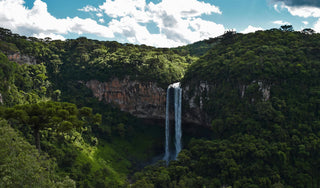You look for local, natural and organic food at the supermarket and generally make the most conscious choices you can that care for you and the planet. But what about your bathroom? There are hidden environmental costs in many mainstream, conventional beauty products that can't stay hidden any more. See how you can switch out the bad for the good - which is not only better for your skin, but the planet too.
1. Avoid palm oil
The problem
Palm oil is so widespread and used in many personal care products, like lotions and creams. It's so popular because it's an efficient, high-yielding plant and the oil produced is so versatile, having many different properties and functions. One of the benefits of palm oil in skincare is its high vitamin E content; a strong antioxidant which helps fight free radicals that damage the skin and cause ageing and fine lines. The problem with using palm oil lies in the vast swathes of pristine rainforest in Malaysia and Indonesia (predominately) that are being turned over to monocultures of palm tree plantations. Endangered species like the Orangutan and pygmy elephant are losing their habitats at a rapid rate (both species are not only adorable but are crucial to the functioning of the Asian tropical forest ecosystem) and the mass deforestation causes millions of tonnes of greenhouse gases to be released into the atmosphere, contributing to climate change, according to the WWF.
The solution
Look for almond oil as an alternative to palm oil. You'll find sustainably-sourced almond oil in our Hero Facial Oil. Grown in rich soils, you can enjoy the protective and anti-ageing benefits from almond oil's vitamin E properties, without damaging precious ecosystems.
2. Seek plastic alternatives
The problem
We have a plastic epidemic. By 2050, the oceans will contain more plastic than fish by weight, that's according to Plastic Pollution Coalition. The problem with plastic is that it's a man-made substance that is not recognised by nature; it takes hundreds of years to break down and when it does break down, tiny toxic particles are produced which are eaten by fish and larger mammals, before reaching all the way up the food chain to us. And even if a plastic bottle can be recycled, most plastic bottles produced end up going to landfill or the ocean - 72% of all plastic packaging, according to the Ellen MacArthur Foundation, further exacerbating the problem.
The solution
So if most of the plastic that is produced ends up in landfill even if it can be recycled, there has to be another way to avoid landfill and the accumulation of toxic chemicals. Choose skincare products where the long-life of the products can be enjoyed even once their contents have been used. Glass is an excellent alternative. All of our amber glass bottles are 100% recyclable and can be recycled indefinitely - and when it does break down, it returns to its natural state, primarily silica sand.
3. Steer clear of mineral oil
The problem
Mineral oil is made from petroleum which is a by-product of the distillation of petroleum to produce gasoline (aka petrol); it's a by-product of the oil and gas industry, which accounts for 50% of global carbon emissions, according to Reuters. It's found in many mainstream, conventional beauty and skincare products, including Johnson's Baby Oil. Mineral oil is used in skincare products to make them feel silky-smooth. But it has such a large molecular structure that it's not recognised by the skin, it sits on the skin's surface, leading to clogged pores and dull-looking skin. The next time you pick up a product on shelf and see mineral oil or "paraffinum liquidum" on the ingredient list, you know it's come from one of the world's most polluting industries and doesn't belong in your skincare routine; that's one to put back.
The solution
Connect with nature instead and look for natural ingredients that will nourish and restore your skin and not pollute the planet. In our Hero Facial Oil, we use argan oil. Sourced from a co-operative of Berber women in Morocco, they're paid fairly for the crops they harvest. We use cold-pressed argan oil which is extracted using a hydraulic press, as opposed to solvent extraction, to ensure that all the nutritional value of the oil is retained.
Are there any switches which you've made? We'd love to hear! Email us at care@bysarahlondon.com.
--
Join our Newsletter to receive our latest news, arrivals and skincare tips straight to your inbox every week. All content © By Sarah. All rights reserved.



